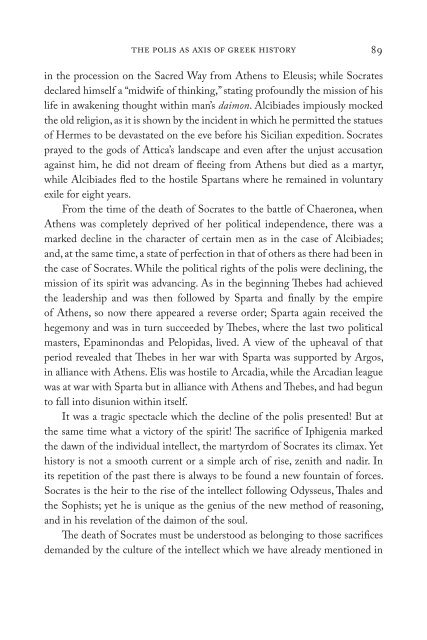The Gospel of Hellas - Research Institute for Waldorf Education
The Gospel of Hellas - Research Institute for Waldorf Education
The Gospel of Hellas - Research Institute for Waldorf Education
You also want an ePaper? Increase the reach of your titles
YUMPU automatically turns print PDFs into web optimized ePapers that Google loves.
the polis as axis <strong>of</strong> greek history<br />
in the procession on the Sacred Way from Athens to Eleusis; while Socrates<br />
declared himself a “midwife <strong>of</strong> thinking,” stating pr<strong>of</strong>oundly the mission <strong>of</strong> his<br />
life in awakening thought within man’s daimon. Alcibiades impiously mocked<br />
the old religion, as it is shown by the incident in which he permitted the statues<br />
<strong>of</strong> Hermes to be devastated on the eve be<strong>for</strong>e his Sicilian expedition. Socrates<br />
prayed to the gods <strong>of</strong> Attica’s landscape and even after the unjust accusation<br />
against him, he did not dream <strong>of</strong> fleeing from Athens but died as a martyr,<br />
while Alcibiades fled to the hostile Spartans where he remained in voluntary<br />
exile <strong>for</strong> eight years.<br />
From the time <strong>of</strong> the death <strong>of</strong> Socrates to the battle <strong>of</strong> Chaeronea, when<br />
Athens was completely deprived <strong>of</strong> her political independence, there was a<br />
marked decline in the character <strong>of</strong> certain men as in the case <strong>of</strong> Alcibiades;<br />
and, at the same time, a state <strong>of</strong> perfection in that <strong>of</strong> others as there had been in<br />
the case <strong>of</strong> Socrates. While the political rights <strong>of</strong> the polis were declining, the<br />
mission <strong>of</strong> its spirit was advancing. As in the beginning <strong>The</strong>bes had achieved<br />
the leadership and was then followed by Sparta and finally by the empire<br />
<strong>of</strong> Athens, so now there appeared a reverse order; Sparta again received the<br />
hegemony and was in turn succeeded by <strong>The</strong>bes, where the last two political<br />
masters, Epaminondas and Pelopidas, lived. A view <strong>of</strong> the upheaval <strong>of</strong> that<br />
period revealed that <strong>The</strong>bes in her war with Sparta was supported by Argos,<br />
in alliance with Athens. Elis was hostile to Arcadia, while the Arcadian league<br />
was at war with Sparta but in alliance with Athens and <strong>The</strong>bes, and had begun<br />
to fall into disunion within itself.<br />
It was a tragic spectacle which the decline <strong>of</strong> the polis presented! But at<br />
the same time what a victory <strong>of</strong> the spirit! <strong>The</strong> sacrifice <strong>of</strong> Iphigenia marked<br />
the dawn <strong>of</strong> the individual intellect, the martyrdom <strong>of</strong> Socrates its climax. Yet<br />
history is not a smooth current or a simple arch <strong>of</strong> rise, zenith and nadir. In<br />
its repetition <strong>of</strong> the past there is always to be found a new fountain <strong>of</strong> <strong>for</strong>ces.<br />
Socrates is the heir to the rise <strong>of</strong> the intellect following Odysseus, Thales and<br />
the Sophists; yet he is unique as the genius <strong>of</strong> the new method <strong>of</strong> reasoning,<br />
and in his revelation <strong>of</strong> the daimon <strong>of</strong> the soul.<br />
<strong>The</strong> death <strong>of</strong> Socrates must be understood as belonging to those sacrifices<br />
demanded by the culture <strong>of</strong> the intellect which we have already mentioned in

















